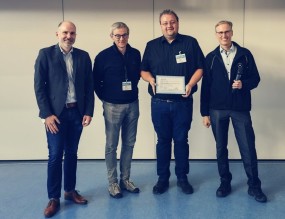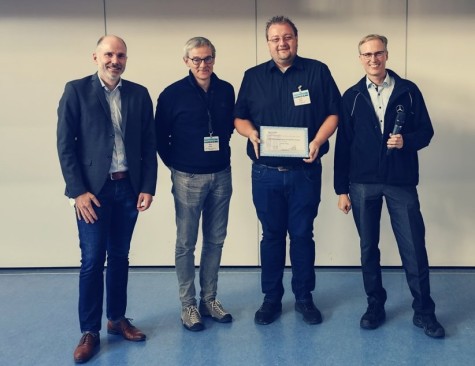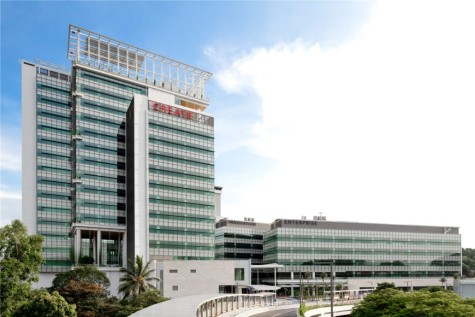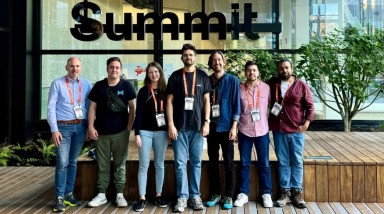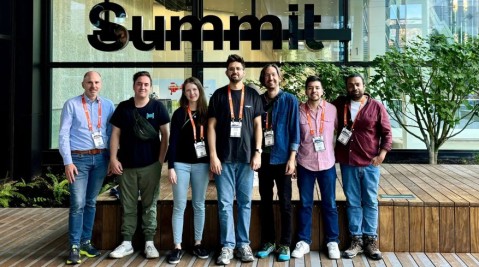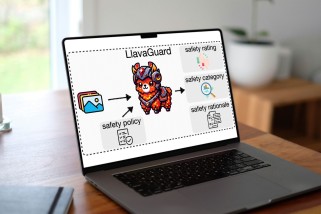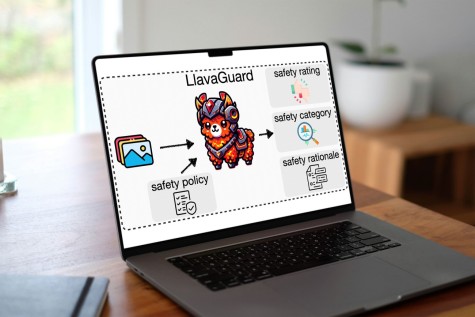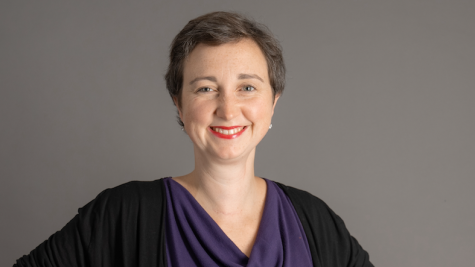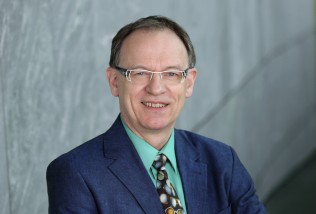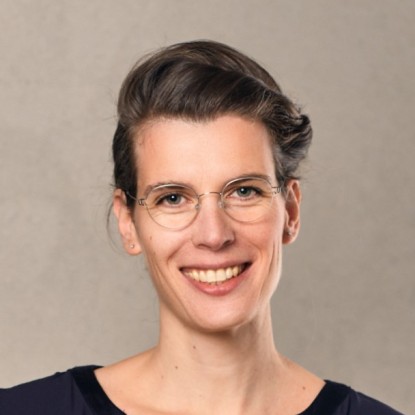-
![]() Picture: Klaus Mai | TU Darmstadt
Picture: Klaus Mai | TU Darmstadt![]() Picture: Klaus Mai | TU Darmstadt
Picture: Klaus Mai | TU DarmstadtMembers of the state parliament Schmitz and Franz visit TU Darmstadt
2024/09/25
ENCRYPTO lab presents research
On Monday (16 September), members of the Hessian state parliament Lucas Schmitz (spokesman for science and the arts) and Peter Franz (member of parliament for the Darmstadt II constituency; both CDU) were guests at TU Darmstadt.
-
![]() Picture: Joachim Schulze
Picture: Joachim Schulze![]() Picture: Joachim Schulze
Picture: Joachim SchulzeAdvertising column 4.0: from advertising to warning
2024/09/18
LOEWE Center emergenCity develops important addition to existing warning system
As part of the warning day organised by the Federal Office of Civil Protection and Disaster Assistance (BBK), the LOEWE centre ‘emergenCITY’ is looking into the question of how the population can be warned in the event of a prolonged power outage. The idea is to integrate the good old advertising column into the warning system.
-
![Von links: Prof. Dr. Stefan Roth (Stellvertretender Vorsitzender der German Association for Pattern Recognition DAGM), Prof. Dr. Bernt Schiele (Vorsitzender der German Association for Pattern Recognition DAGM), Preisträger Prof. Justus Thies und Stefan Gehrig (Mercedes-Benz AG).]() Picture: GCPR-VMV Conference
Picture: GCPR-VMV Conference![Von links: Prof. Dr. Stefan Roth (Stellvertretender Vorsitzender der German Association for Pattern Recognition DAGM), Prof. Dr. Bernt Schiele (Vorsitzender der German Association for Pattern Recognition DAGM), Preisträger Prof. Justus Thies und Stefan Gehrig (Mercedes-Benz AG).]() Picture: GCPR-VMV Conference
Picture: GCPR-VMV ConferenceProfessor Justus Thies receives German Pattern Recognition Award
2024/09/12
Award for outstanding contributions by young researchers in the fields of pattern recognition, machine vision and machine learning
TU Professor Justus Thies was awarded the German Pattern Recognition Prize at this year's GCPR-VMV conference in Munich.
-
![Justus Thies vor unscharfer Fensterfläche, schwarz gekleidet, nur Oberkörper]() Picture: Patrick Bal
Picture: Patrick Bal![Justus Thies vor unscharfer Fensterfläche, schwarz gekleidet, nur Oberkörper]() Picture: Patrick Bal
Picture: Patrick BalThe convincing digital doppelganger
2024/09/05
ERC supports TU professor Justus Thies with Starting Grant
TU professor Justus Thies is receiving a Starting Grant totalling 1.5 million euros from the European Research Council (ERC) for his project ‘Learning Digital Humans in Motion’. The exciting research goal: to develop AI-based image processing and graphic tools to create lifelike digital representations of people for the immersive digital world.
-
![]() Picture: Katrin Binner
Picture: Katrin Binner![]() Picture: Katrin Binner
Picture: Katrin BinnerGiving AI a robotic body
2024/09/05
TU professor Georgia Chalvatzaki receives ERC Starting Grant for her project SIREN
The “SIREN” research project at TU Darmstadt has been awarded a Starting Grant by the European Research Council (ERC). Professor Georgia Chalvatzaki will receive around 1.5 million euros of funding for five years. The computer scientist is researching innovative AI robot software architectures, which enable human-like robots to perform challenging tasks in unstructured and dynamic environments.
-
![Mueller, Florian]() Picture: TU Darmstadt/Patrick Bal
Picture: TU Darmstadt/Patrick Bal![Mueller, Florian]() Picture: TU Darmstadt/Patrick Bal
Picture: TU Darmstadt/Patrick BalNew at the Department: Professor Florian Müller
2024/09/03
Mobile Human-Computer Interaction
How do we want to organise our future mobile interaction with information?
-
![CREATE Tower, National Research Foundation, Singapore]() Picture: CREATE Tower, National Research Foundation, Singapore
Picture: CREATE Tower, National Research Foundation, Singapore![CREATE Tower, National Research Foundation, Singapore]() Picture: CREATE Tower, National Research Foundation, Singapore
Picture: CREATE Tower, National Research Foundation, SingaporeTU co-organises leading conference on research into resilient systems
2024/08/27
From 28 to 30 August, more than 150 scientists will come together for the International Conference on Resilient Systems (ICRS) at the CREATE Tower in Singapore. The ICRS is one of the leading interdisciplinary conferences in resilience research. For the first time, it will also be co-organised by emergenCITY representatives. The LOEWE centre emergenCITY is an interdisciplinary and cross-location cooperation under the leadership of TU Darmstadt.
-
![]() Picture: Mohamed Hassan / Pixabay
Picture: Mohamed Hassan / Pixabay![]() Picture: Mohamed Hassan / Pixabay
Picture: Mohamed Hassan / PixabayLab 1141 for safe and transparent GenAI
2024/08/26
TU Darmstadt part of new lab with Aleph Alpha
TU Darmstadt is establishing a joint laboratory with Aleph Alpha Research, the research arm of the Heidelberg-based AI company Aleph Alpha. The aim of ‘Lab 1141’ is to further develop safe and transparent generative artificial intelligence (AI). The collaboration is intended to close gaps between academic research and industrial development.
-
![]() Picture: Tada Images - stock.adobe.com
Picture: Tada Images - stock.adobe.com![]() Picture: Tada Images - stock.adobe.com
Picture: Tada Images - stock.adobe.comIndependent, complex thinking not (yet) possible after all
2024/08/12
Study led by the UKP lab shows limitations of ChatGPT & co.
According to a new study led by TU Darmstadt, AI models such as ChatGPT are apparently less capable of learning independently than previously assumed. According to the study, there is no evidence that what are known as large language models (LLMs) are beginning to develop a general “intelligent” behaviour that would enable them to proceed in a planned or intuitive manner or to think in a complex way. The study will be presented in August at the annual conference of the renowned Association for Computational Linguistics (ACL) in Bangkok, the largest international conference on automatic language processing.
-
![]() Picture: Simone Schaub-Meyer
Picture: Simone Schaub-Meyer![]() Picture: Simone Schaub-Meyer
Picture: Simone Schaub-Meyer“RAI” researchers awarded
2024/08/08
Successful participation in renowned conference
Researchers from the “Reasonable Artificial Intelligence” (RAI) project took part in this year's “Conference on Computer Vision and Pattern Recognition” (CVPR) and successfully presented the results of their work in workshops and conference papers. “RAI” is in the running for a Cluster of Excellence in the prestigious Excellence Strategy of the German federal and state governments.
-
![]()
![]()
In memoriam: Prof. Dr.-Ing. Hans-Jürgen Hoffmann
2024/07/20
The Department mourns the loss of a first-time member
It is with great regret that we bid farewell to Prof. Dr.-Ing. Hans-Jürgen Hoffmann who passed away on July 7th at the age of 89.
-
![]() Picture: Adobe Stock/Mr.Mockup/TU Darmstadt
Picture: Adobe Stock/Mr.Mockup/TU Darmstadt![]() Picture: Adobe Stock/Mr.Mockup/TU Darmstadt
Picture: Adobe Stock/Mr.Mockup/TU DarmstadtSafeguard against offensive image content
2024/07/10
AIML research team presents innovative safety tool “LlavaGuard”
Researchers at the Artificial Intelligence and Machine Learning Lab (AIML) in the Department of Computer Science at TU Darmstadt and the Hessian Center for Artificial Intelligence (hessian.AI) have developed a method that uses vision language models to filter, evaluate, and suppress specific image content in large datasets or from image generators. The research is part of the “Reasonable Artificial Intelligence (RAI)” cluster project, which has submitted a full application to the Excellence Strategy of the German federal and state governments for the “Clusters of Excellence” funding line.
-
![]() Picture: Katrin Binner | TU Darmstadt
Picture: Katrin Binner | TU Darmstadt![]() Picture: Katrin Binner | TU Darmstadt
Picture: Katrin Binner | TU DarmstadtLOEWE Top Professorship for Data Management expert Carsten Binnig
2024/07/03
State programme supports application for Cluster of Excellence “Reasonable Artificial Intelligence”
Professor Dr. Carsten Binnig, an expert in Artificial Intelligence (AI) and Data Management, has been awarded a LOEWE Top Professorship at TU Darmstadt. The state of Hesse is thus supporting the “Reasonable Artificial Intelligence (RAI)” research project as part of the Excellence Strategy of the federal and state governments. At the beginning of the year, the project successfully cleared the first hurdle on its way to becoming a Cluster of Excellence. The LOEWE Professorship will be funded over five years with around two million euros from LOEWE funds.
-
![Portrait von Dr. Linda Frey]() Picture: Steffi Schmall
Picture: Steffi Schmall![Portrait von Dr. Linda Frey]() Picture: Steffi Schmall
Picture: Steffi SchmallNew at the Office of Student Affairs
2024/07/01
International Affairs and Admissions Officer
Since June 1, Dr. Linda Frey has been supporting the Office of Student Affairs as International Affairs and Admissions Officer. After completing her bachelor's degree in mathematics with a minor in computer science at the University of Mainz, Frey went on to complete her master's degree in mathematics at the ETH in Zurich. She started her PhD in mathematics in Frankfurt and followed her supervisor to Darmstadt and later to Basel, where she graduated magna cum laude. We asked her what her work in the Department will entail.
-
![]() Picture: Benjamin Schenk/Fotostudio Hirch
Picture: Benjamin Schenk/Fotostudio Hirch![]() Picture: Benjamin Schenk/Fotostudio Hirch
Picture: Benjamin Schenk/Fotostudio HirchPutting Humans at the Center
2024/06/12
An interview with Prof. Dr. Max Mühlhäuser
Professor Max Mühlhäuser is one of the pioneers in the field of ubiquitous computing, the ubiquity of computers and the networking of systems. A professor at the Department of Computer Science, he has set standards in UC research in Europe. The computer scientist has been teaching and researching at TU Darmstadt for almost 25 years. He will soon be retiring, but with rapid developments in artificial intelligence, augmented reality, data misuse and the threat of cyber-attacks, he intends to remain involved in research.
Computer Science
News
Archive





